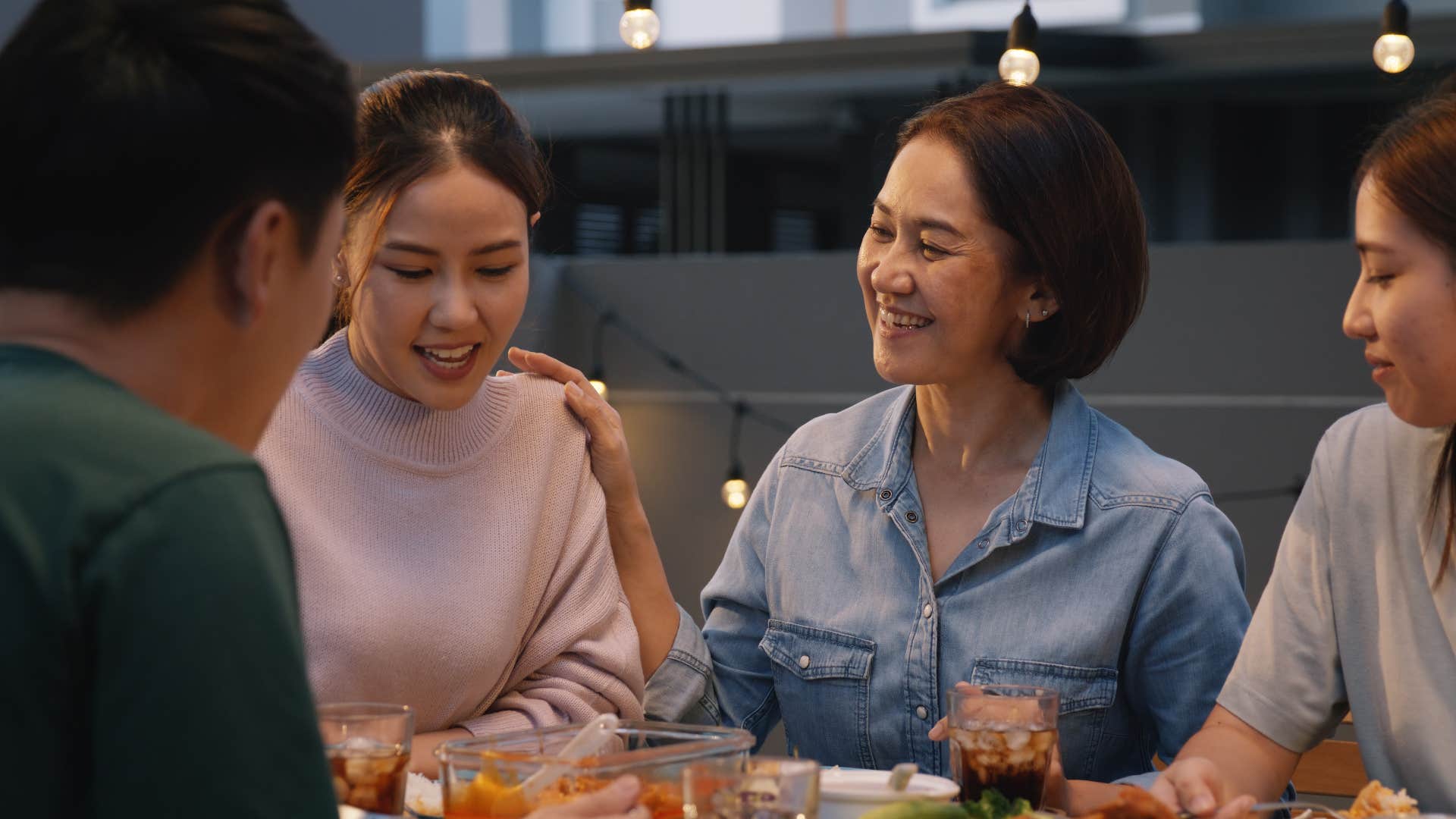11 Things That Were Once Considered Polite But Now Young Generations Think Are Rude
Social norms and expectations are always changing.
 Aleksandr Denisyuk | Shutterstock
Aleksandr Denisyuk | Shutterstock There's no denying that social norms and values shift drastically over time, like a 2024 study suggests. As new, younger generations enter adulthood, the workforce, and other institutions, they bring their individualized perspectives and beliefs with them, ultimately shifting and changing things for everyone as they evolve and find their way.
That's why there are many things that were once considered polite but now young generations think are rude. From navigating greetings with someone in social interactions to showing up to spend time with your family, there are new expectations and boundaries that younger generations like Gen Z have crafted — many of which are wildly different from the largely traditionalist ideals of their boomer counterparts.
Here are 11 things that were once considered polite but now young generations think are rude
1. Giving unsolicited advice
 fizkes | Shutterstock
fizkes | Shutterstock
The closer you are with someone, the more likely you are to give unsolicited advice, according to a study from the Journal of Social and Personal Relationships. Whether it's a conversation with your best friend or a catch-up with your mother over the phone, these kinds of relationships often harbor a ton of unsolicited advice, but it's not always healthy.
In fact, Gen Z is largely calling out the dismissive nature of unsolicited advice, especially revolving around interactions with their parents as they enter adulthood. When they're looking for someone to make space for their emotions and support them while they're venting, the last thing they want to hear is a piece of unsolicited advice that urges them to sweep up and "solve" what they're feeling.
While their parents and grandparents may find this "solution-oriented" behavior to be healthy, especially considering many believe emotions should be quickly pushed under the rug and ignored, it's one of the things that younger generations now consider to be rude.
2. Showing up unannounced
 BearFotos | Shutterstock
BearFotos | Shutterstock
While baby boomers and other older generations may consider "dropping by" or stopping over unannounced to be respectful, especially because they appreciate face-to-face conversations and interactions, it's largely one of the things that younger generations believe is rude.
Not only does it throw off their schedule and force them to indulge in social interaction that they might not be ready for or comfortable with in the moment, it can intrude on their safe space without any warning.
3. Calling instead of texting
 Mariana_erato | Shutterstock
Mariana_erato | Shutterstock
According to a survey conducted by Robert Walters, Gen Zers and other younger generations largely find phone calls to be intrusive and uncomfortable, especially if they're unexpected. They'd prefer to text people or send emails offline than talk to people "face-to-face" over Zoom or phone calls.
However, for many baby boomers, talking on the phone is their primary mode of connection — something they believe to be more respectful and polite than simply sending a text message. For some, it may even be more accessible to pick up the phone and call, but it's now a symbol of rudeness for Gen Zers who prefer everything to be offline.
4. Forcing a hug
 MDV Edwards | Shutterstock
MDV Edwards | Shutterstock
According to a UCLA study, Gen Z is primarily motivated by internal safety. They want to feel comfortable, safe, and fulfilled in their lives, so it's not surprising that they're more likely to set boundaries and express their needs than their older peers and family members.
Even when it comes to personal space, they're more likely to ask before they give someone a hug and may even set boundaries around their own and their kids' own personal space. Compared to baby boomers and other older generations that consider hugs and handshakes to be polite and professional, they're some of the things that Gen Z thinks are rude today.
5. Using formal titles to address someone
 fizkes | Shutterstock
fizkes | Shutterstock
Many Gen Zers now acknowledge the complicated and controversial history of formal titles like "Mrs" or "Mr," which is why they're considered to be rude amongst younger generations today. They were once a way to exclude and promote certain social statuses, many of which are no longer appeasing or desired by young people today.
Of course, they're also one of the things that were once considered polite for older generations, so using them causes a lot of tension. Older people believe they're being respectful and polite, but they're largely misunderstood and demonized by their younger counterparts.
6. Expecting 'thank you' notes for everything
 Syda Productions | Shutterstock
Syda Productions | Shutterstock
Especially considering younger generations largely live and communicate entirely online, sending text messages to thank people for birthday cards, and sometimes picking up the phone to express their gratitude, it's not surprising that handwritten "thank you" notes are largely outdated.
Of course, you should write them if you want to — experts even suggest that they're powerful in our ultra-digital age — but feeling expected to receive one or pressuring a young person to write them, when there are conveniences like a phone around, is now perceived as rude, rather than polite.
7. Respecting elders
 Ground Picture | Shutterstock
Ground Picture | Shutterstock
Considering many younger generations feel consistently disrespected and misunderstood by their Gen X and baby boomer counterparts, it's not surprising that they're not feeding into social norms like "respecting elders" anymore. If they're not receiving respect and consideration from their elders, they're not going to stay silent or tolerate misbehavior for the sake of upholding a misguided social norm.
Of course, this is one of the things that were once considered polite but now younger generations think are plainly rude.
8. Insisting everyone finish their plate
 Chay_Tee | Shutterstock
Chay_Tee | Shutterstock
Like experts from the University of Michigan argue, forcing children to clean their plates at dinner, rather than listening to their own bodies and hunger cues, can often prompt incredibly unhealthy relationships with food later in life. That's part of the reason why insisting people clean their plates is one of the things that were once considered polite, but now younger generations think are rude.
Of course, these behaviors are hardly ever indulged from a malicious perspective. In fact, they're largely well-mannered. However, with shifts in social norms and Gen Z's insistence on crafting better relationships with their mental health, these new studies, experiences, and ideas have come to the surface.
9. Commenting on someone's weight
 fizkes | Shutterstock
fizkes | Shutterstock
Phrases like "You look so good" referring to someone's weight or "How'd you lose that weight?" were once things that were considered polite compliments, but now young generations think are rude.
Like psychologist Rachel Needle explains, weight loss can often be a symptom of grief, mental health struggles, loss, health issues, or eating disorders, which is why commenting on a person's appearance — whether good or bad — is often a poor compliment and use of conversation.
So, if you want to give someone a compliment about how they look, try shifting your focus to something more meaningful and fulfilling than their weight, especially if you don't know the whole story.
10. Telling someone how to live
 fizkes | Shutterstock
fizkes | Shutterstock
Whether it's a comment like "You'd be happier if..." or a phrase like "I'd never have the confidence to wear that," telling someone how they should live might have been considered polite or well-meaning for older generations, but for Gen Z and other young people today, it's tone deaf.
Many older generations grew up in a completely different world from today, so hearing unsolicited advice about how "they should live" only feels invalidating and dismissive.
11. Ordering for someone
 BearFotos | Shutterstock
BearFotos | Shutterstock
Even if it was considered polite for older generations, ordering for someone at a restaurant today is something that younger generations perceive to be rude. Not only does it take away a person's autonomy when it's done without asking, it can create a weird dynamic between everyone at a dinner table.
They're disrespectful to many people, even if, in the moment, they feel polite and complimentary.
Zayda Slabbekoorn is a senior editorial strategist with a bachelor's degree in social relations & policy and gender studies who focuses on psychology, relationships, self-help, and human interest stories.

